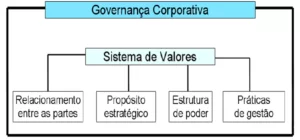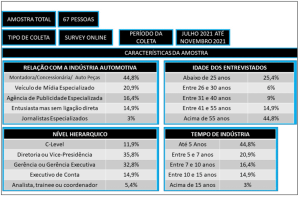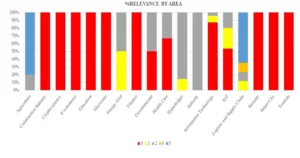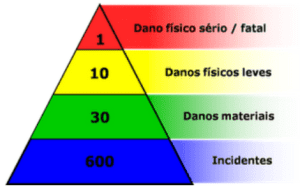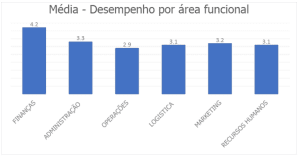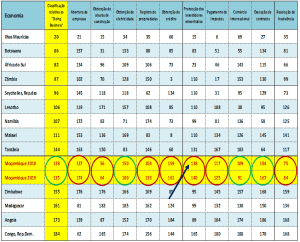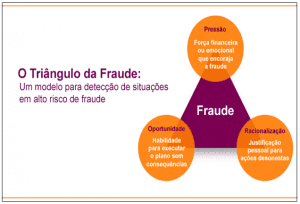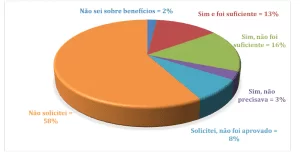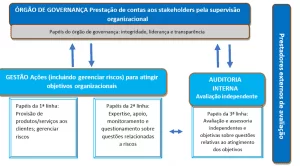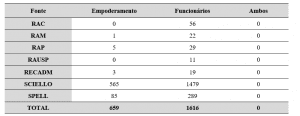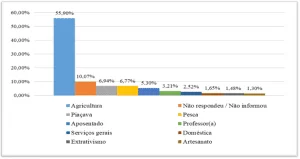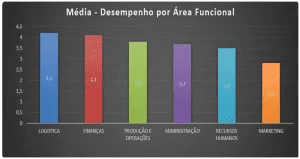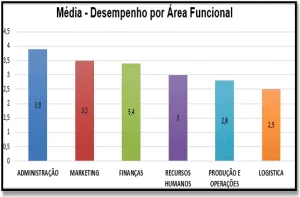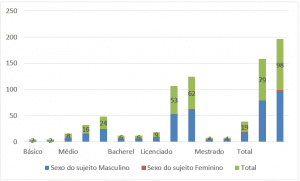ORIGINAL ARTICLE
SILVA, Jadson Luís da [1], STASSUN, Cristian Caê Seemann [2]
SILVA, Jadson Luís da. STASSUN, Cristian Caê Seemann. The performance of the courts of Auditors in the exercise of external control over public policies related to high school. Revista Científica Multidisciplinar Núcleo do Conhecimento. 04 year, Ed. 08, Vol. 05, pp. 50-64. August 2019. ISSN: 2448-0959
SUMMARY
This article presents the actions of the courts of Auditors in the exercise of external control over public policies aimed at high school, critical stage of public education. The research was implemented through the verification of the bibliography on the matter, legal diplomas that guide the performance of external control and technical data extracted from reports of audits, inspections and opinions. It seeks to explain the important role of the courts of Auditors as an instrument for the induction and realization of public policies in the Brazilian scenario, based on the contextualization of the control inserted in the globalized society with new paradigms founded on Constitutional contemporary doctrine. Thus, the objective is to overcome the idea of purely formal control, which is limited to aspects pertinent to the legality and conformity of acts, seeking in the constitutional text values that provide an action directed to the qualitative analysis of Public policies.
Keywords: Court of Auditors, public policies, high school.
1. INTRODUCTION
The present work seeks to demonstrate how the external control of the courts of Auditors on public policies directed to the state’s high school, can guarantee not only the legality and regularity of the application of public resources, But, preciously, contribute to the effectiveness of social policies and services provided by the State, reducing inequalities in the area of education, focusing on high school.
As a methodology, a bibliographic research was carried out on the theme, doctrine, legislation and jurisprudence governing and guiding the performance of external control, referential texts on social policy, documentary research on the Internet, articles and News published in the media about high school and its inequalities in the country, as well as technical data extracted from opinions, reports of audits and inspections carried out by the Court of Auditors of the state of Santa Catarina.
Data presented by the National Institute of Educational Studies and research Anísio Teixeira (INEP), responsible for the application of Pisa in Brazil, show that there is great inequality between states in the country in relation to the results of the examination. In science, the state that obtained the highest score was the Espírito Santo, with 435 points. The state with the worst performance was Alagoas, with 360 points. According to the organization’s criteria, 30 points in Pisa are equivalent to one year of schooling. This means that, on average, there are more than two years of difference between the two states. The average of Brazil in sciences was 401 points. In Reading, whose average of Brazil was 407 points, and in mathematics, whose average was 377, 15 states were below the national average: Roraima, Mato Grosso, Rio de Janeiro, Pará, Pernambuco, Rondônia, Amapá, Paraíba, Rio Grande do Norte, Piauí, Sergipe, Maranhão, Tocantins, Bahia and Alagoas (AGÊNCIA BRASIL, 2016).
It is highlighted that among the factors reported by INEP in the Brazilian scenario that end up having a considerable impact, it is the low performance of high school students. Another aspect is the rate of repetition that, among other factors, can really discourage students.
The socioeconomic factor also influences, reflecting on poor school performance. However, research reports that students with higher socioeconomic status generally tend to take higher scores.
The educational framework of the Brazilian high school did not improve the quality, is still negative, and neither equity in the last 13 years.
Says the Executive Secretary of the Ministry of Education (MEC), Maria Helena Guimarães de Castro: “The only improvement in the country was in the flow. It is important to record that 77% of the students who did Pisa are in high school “(AGÊNCIA BRASIL, 2016).
2. THE WELFARE STATE
The Welfare state emerged at the beginning of the TWENTIETH century as an outlet for the maintenance of the capitalist economic model at a historical moment in which the social malpractices of exacerbated capitalism opened the doors for the implantation of a system Economic basis based on the collective appropriation of the means of production, following the Soviet model inserted with the Russian Revolution of 1917. Thus, the bourgeois class, benefited by economic liberalism, remained the following alternative: or flexibilized the capitalist model, enabling the protection of the proletariat exploited through the prediction of labor laws and other social benefits, Or risk seeing another revolution erupts, now contrary to bourgeois interests.
The change in the adopted state model was reflected in the legal order, since, during the Liberal state, the focus was on the individual rights, especially the freedom, in the era of the welfare state, the attentions turn to the social rights that pass the appear in the Constitutions of the TWENTIETH century as are the example of the Mexican Charter of 1917 and the Weimar Constitution of 1919.
As a result of the implementation of the Social state, some important changes have been raised in the legal context, such as the emancipation of labor law as an autonomous branch of legal science and the increase in public order norms in order to limit the autonomy of Will. This role deserves special emphasis on the recognition of the second dimension of fundamental rights in positive law. These rights are characterized by granting the individual rights to social benefits in the face of the state, imposing a duty to meet positive benefits to be implemented through public policies. It can be seen, therefore, that while the Liberal state is legitimated through abstention or non-intervention, guaranteeing protection to the private sphere of individuals, the Social state legitimates itself, on the contrary, by acting in the social environment and implement the programs of Governance and the effectiveness of rights, especially those of a prestational nature (BANDEIRA DE MELLO, 2003, p. 130).
It is true that the constitutions reflect the political and economic option of the State and society. Thus, while the defensive constitutions, proper to the Liberal state, demanded a minimalist state, whose intervention was justified only to protect and guarantee the freedoms of the individual, the constitutive constitutions or directors, typical of the State of welfare proposes an interventor state, with goals and plans of government advocated in the Constitution, especially in the economic and social sectors. At this moment, a state is configured that has social commitments, whose effectiveness depends on the actions of the political and judicial organs.
The Social state, therefore, is not content to guarantee the mere formal equality of all before the law, and it is necessary to achieve material equality, so that people can have the minimum conditions to enjoy the freedom that was guaranteed to them only Formally. There is, therefore, a clear interdependence between fundamental rights. The legal guarantee of the right to individual freedom is not sufficient if the social system is not sufficiently equitable so that people can have the material conditions that allow them to exercise that freedom.
On the distinctions between the formal equality and above mentioned material clarifies Piovesan (1998), focusing on the change of constitutional perspective caused by the advent of the state of Social welfare, in Verbis:
Equality is thus transformed into an essential value of the constitutional system, making it an imperative criterion for the constitutional interpretation in the field of social rights. The right to equality is raised to the right-guardian of the Social state. It is now transiting from the formal legal equality of liberalism to the material equality of the contemporary Social state. It is not more of an equality before the law, but of an equality made by law and through Law (PIOVESAN, 1998, p. 35).
There was, therefore, a change of understanding about the scope of the legal principle of equality that began to consefy the need for action and state intervention to enable the realization of social justice. This commitment to enforce fundamental rights, especially the social and economic ones, is portrayed in the constitutive constitutions, address[3]ing not only the legislature and the executive, but also the judiciary, the Public Prosecutor’s Office and the Court of Accounts.
The actions of the aforementioned organs and powers must be, from the perspective of the governing constitution, promotional in order to effect the fundamental rights provided for in the Constitution.
It can be seen, therefore, that the constitutions of the directors or constitutives establish, normatively, programs of political action, establishing goals and priorities of an economic, social and cultural nature to be achieved, linking all the organs of political direction. Such constitutions are not restricted to organizing political power and to share competences, they go beyond, because they propose a conformation of the political action of the State aiming at achieving material equality within society.
3. CLASSIFICATION OF FUNDAMENTAL SOCIAL RIGHTS
To address the classification of social rights, it is first necessary to clarify that fundamental rights exert, according to the proposed classification brought by Ingo Sarlet, inspired by the lessons of Robert Alexy, various functions, and can be Rights of defence or rights to benefits (SARLET, 1998, P. 180).
Thus, fundamental rights as rights of defense aim to protect individual autonomy, assuring the individual the right to repel abusive interventions in the exercise of his/her freedom. In this way, the rights of defence demand from the state and from individuals an abstention. In this category, predominantly, first-dimension rights such as the right to freedom, formal equality, right to life and property, linked to the ideals of the Liberal state, are identified.
The fundamental rights as rights to benefits, on the contrary, require the addressees of the norm, especially the public authorities, an active conduct in order to provide individuals with the material means necessary for the exercise of a Freedom Effective, promoted by state intervention in the economic and social order in order to ensure material equality. These rights to benefits are mainly linked to the second dimension of fundamental rights and to the postulates of the Social state. This does not mean, however, that there are rights to benefits, only in the context of social rights, because, as INGO W. SARLET explains, the right of political parties to the resources of the Partisan Fund (art. 17, paragraph 3 of the CF) and the right of access to justice and to full and free legal assistance (art. 5th, section XXXV and LXXIV of the CF) demonstrate that the provision of rights can be found in the list of individual and political rights, not limited only to social rights (SARLET, 1988, P. 15).
Continuing the classification of fundamental rights to benefits, one can subdivide them into: 1. Full-sense benefits entitlements end up including rights to protection and participation in proceedings; 2. Rights to benefits in a strict sense which provide for a material provision to be provided, more often, by the state, within the conception of the welfare state. In fact, it is in this ultimate category that the social rights of health, education, housing, care, welfare, among others enunciated in art, are framed. Sixth, of the Federal Constitution.
It is true that, in the context of social rights, the need for economic resources and the demand for formulation and the implementation of public policies in charge of the legislature and the executive are more evident. However, it should be emphasized that the rights of defense also lack public investment for its effectivation, in addition to the institutional and procedural infrastructure of State agencies capable of ensuring the maintenance of public order and the exercise of the right to Freedom by individuals.
So, for example, in order to ensure the right to come and go from people, it is necessary that the state has both a posture of respect and non-intervention in the sphere of individual freedom, and it is also necessary for the existence of instruments As the habeas corpus and the structure of the judiciary, guaranteeing the right to come and go from the people against any violations.
In this hypothesis, the guarantee of the right of freedom demands the public investment in financial and human resources to cover the structure of the judiciary, or to empower State agents, in particular, the military police to have the conduct of Respect for human rights and, in the case mentioned, do not interfere with the freedom to come and go from people in situations of social normality.
To what extent, then, can we accept without reserve the argument of less effective social rights in terms of the scarcity of public resources? The financial resources raised by the State must obey an order of budgetary priorities with a view to the dignity of the human person. This is because, if the dignity of man is the foundation of the Brazilian state and the implementation of social rights is indispensable to live worthily, because the lack of financial resources is, in general, the main obstacle to the full effectiveness of social rights Instalment? Should the definition of public expenditure be left out of control? These are issues that will have development in their own headquarters, but are currently being raised only because they relate to the rights of defense and the social rights provided, according to the classification mentioned.
The functional classification of fundamental rights is useful for identifying the differences between the various classes of fundamental rights and the preponderant functions, in particular as regards the object of the provision and the normative structure of Rights of defence and of the provision of rights. However, in our view, such differences should not serve the argument of lower effectiveness of social fundamental rights, they only point out that the effectiveness of these rights lacks the greatest effort of the public authorities.
3.1 OF THE EFFECTIVENESS OF THE SOCIAL RIGHTS PROVIDED
The Social state as already mentioned arose from the need to recognize certain social, economic and cultural rights arising from the political demands of the working classes that began to organize to combat the serious social problems Resulting from the industrialization process and the adoption of a capitalist system without ethical brakes.
Thus, after the First World War, these second-dimension rights began to be recognised in the constitutional order of several states of law, as is the case of the Weimar constitution of 1919, which, in view of the widespread systematization adopted for the rights of Social nature, contributed to the formulation of the Brazilian Social State in 1934 to the present day (LASSALE, 2001, p. 90).
Notwithstanding the constitutional recognition of social and economic rights has been an important step in the historical achievement of fundamental rights, it is not in itself sufficient to ensure its effectiveness. In fact, for these rights to request from the State a greater performance in the formulation and implementation of public policies and depend, for its effectivation, of funds and public investment, there were those who argued that social rights did not have juridicity. Its effectiveness was initially denied, because it would be conditional on the existence of financial and material conditions to meet the constitutional command. Moreover, the norms of social nature were considered, at least mostly, of a programmatic nature, because in the face of their low normative density, they would depend on legislative complementation to be fully effective.
Thus, for a long time, it was considered that the constitutional norms that consecrated social rights, would be only declarations of good intentions, without the juridical legal character, constituting the ethical values of society. The existence of a mandatory legal relationship between the citizen and the State (in which the first figure was in the creditor’s position and the second as a debtor of social benefits) was not admitted to the ground that the public law could not be recognised Subjective in the face of the state, because the duty of the State in relation to the rights of education and health would have only moral content, of orientation to the good public administrator, without constituting a bond (CRETELLA JUNIOR, 1988, p 884).
Such positioning is theoretically exceeded, and rightly so, it should be recognised that social fundamental rights, at least a consistent minimum legal efficacy, among other things, repeal the rules that are contrary to them and prevent That there is normative or material action in confrontation with the essential and uncontroversial content of the fundamental right outlined in the Constitution, under penalty of declaration of unconstitutionality.
However, it should be noted that today, according to modern constitutional[4] doctrine, it has been sought to recognise greater legal effectiveness of fundamental rights, especially those of a social nature, by attributing them to a normative and binding efficacy to Public authorities.
According to art. 5th, paragraph 1 of the Federal Constitution, it is seen that “the defining norms of fundamental rights and guarantees have immediate application”. Notwithstanding this norm is situated in the chapter of individual and collective rights, its incidence extends to the other fundamental rights provided for in the Brazilian Constitution and in the international treaties that Brazil is a part of, including the Social rights. This is due not only to the literal interpretation of the expression “fundamental rights and guarantees”, but also in the face of teleological interpretation, given that the Brazilian constituent, as we know, did not foresee different legal regimes for Fundamental rights of defense or provision, on the contrary, treated them uniformly in spite of the differences in the normative structure.
But with regard to the norm that provides for the immediate applicability of fundamental rights, what is really important is to know what its interpretation is in the face of the social rights provided. In other words, how do you understand that a social right that lacks a factual state provision can be immediately applicable?
Several positions are found in the national doctrine. Sarlet (1998) understands that art. 5th, § 1, of the Federal Constitution must be understood as a principle, in its words, an “optimization warrant” in which it “establishes to the state agencies the task of recognizing, in the light of the concrete case, the greatest possible effectiveness to all the norms Fundamental rights and guarantees “(p. 29).
4. THE PERFORMANCE OF THE COURTS OF AUDITORS IN THE EXERCISE OF EXTERNAL CONTROL OVER PUBLIC POLICIES RELATED TO HIGH SCHOOL
The courts of auditors in the Brazilian scenario, with the promulgation of the Federal Constitution of 1988, acquired a new connotation as well as new competences, greater administrative and financial autonomy, and from that context became an organ totally Any of the State powers.
According to Santana (2016), the Court of Auditors of the Union became competent in the area of accounting, financial, budgetary, operational and patrimonial supervision of the Government, as well as the entities of direct and indirect administration, as to the legality, legitimacy, effectiveness and economicity.
The Court of Auditors began to exercise its functions based on a new perspective of public administration control in the current context, where external control bodies can contribute significantly and decisively in the aspect of seeking to protect the Citizens ‘ rights. This was due to the narrowing of the relations of the control organs and the society itself in seeking to increase the oversight of public spending and to depart from the mere verification of the formality of the acts.
Thus, there was an increase in the effectiveness of social and public policies, as well as the services provided by the Courts of Auditors, contributing to strengthen citizenship and, consequently, the Brazilian democratic regime.
It is also noteworthy the importance of external control bodies in defending fundamental rights when performing their constitutional duties.
It is essential in this new economic scenario, that the control of public management, as well as the implementation of the financial resources that are performed by the State, are unnecessarily implemented always autonomously and independently, in such a way That are converted to the benefit of the population that makes up this state, and can also act actively, prohibiting the wastes and deviations from public funds.
In the Brazilian conjuncture of the last decade, public expenditures in the educational structure showed significant growth when compared and verified according to the national GDP. The expectation is that these expenditures continue to grow in the three spheres of government, both in real values and in relation to GDP, mainly due to the goals set in the National Plan of Education-PNE, to expand public investment in Education to 7% of GDP, in the fifth year of the plan, and to 10% of GDP at the end of its term, in 2024.
It is challenging high school in the Brazilian scenario, because there are several aspects that hinder the guarantee of access and, moreover, to achieve that the young people conclude this stage of teaching.
According to the Court of Auditors of the Union (2016), another challenging point for public policies in the national context is to seek the reduction of the inequalities indicated by the indices analyzed by the IDEB-basic Education Development Index, between the networks Public and private and between States. A coordinated audit of the Court of Auditors of the Union with 28 Brazilian courts of auditors found: deficiencies in the management and infrastructure of the network; Teacher deficit; Excess of teachers under the temporary hiring regime; Significant differences in spending accounting; Indefinition of minimum value per student as a parameter of the Union complementation to Fundeb; and lack of regulation of minimum quality standards.
From the study and monitoring of the management in the educational area of the state of Santa Catarina, specifically the high school in the period 1998 to 2018, it was found that the Court of Auditors of the state of Santa Catarina (TCE/SC) evidenced in opinions (SANTA CATARINA, 2017) and Audit reports (ECA, 2018), restrictions that are noteworthy: deviation of purpose and poor application of public resources; Inefficiency of public policies: inadequate planning, implementation and monitoring; Inadequate in relation to equipment intended for teaching and maintaining schools; Wage policy as well as training and updating programs that do not adequately value the professionals of the Magisterium; Failure to comply with the budget for high school, as predicted in the annual budget law, failing to execute all the established budgetary and financial programming.
As a result of the investigation, the Santa Catarina Court of Auditors forwarded recommendations and determinations to the State Secretariat of Education of Santa Catarina in order to remedy the irregularities, as well as to apply the applicable sanctions provided for by law.
Therefore, it was observed the establishment of corrective actions by the State Secretariat of Education aiming to solve the problems raised in the audits and inspections implemented by the Court of Auditors of the State, however, were Insufficient to reverse the framework of mismanagement of public policies and inefficiency in the application of public resources destined for high school.
The above exposes the need to reinforce the implementation of operational audits and periodic monitoring within the Court of Auditors of the State, as an instrument of evaluation and effectiveness of public policies aimed at high school.
The performance of the Court of Auditors in the evaluation of public policies will contribute to the efficiency of public spending, as well as to the development of social rights and the reduction of inequalities.
It is timely to register that legal-formal supervision is not sufficient to meet the public interest. It is necessary to encourage and broaden the possibility of participation of society (social control) in the exercise of control.
5. CONCLUSIONS
By developing the theme of external control in charge of the courts of Auditors on public policies related to high school, which, in summary, focuses on the implementation of social rights in the educational field, through the action of the Court of Auditors, Compliance with the objectives laid down in art. 3rd, of the Federal Constitution, which ultimately seek the promotion of social justice.
Thus, the prediction of the basic principle of the dignity of the human person as the foundation of the Brazilian state, seeks to reinforce the understanding that the reason of being of the state is to promote the good of all.
The dignity of the contemporary man in the current context, as a socially affine value, goes far beyond the purely subjective aspect of both the moral and ethical qualities of the person, as it demands an involvement of the existence of minimal material conditions to He can survive and develop free-form. But for this to happen, it is essential that the welfare state can guarantee the effectiveness of Brazilian social rights.
In this conjuncture, in the light of the Brazilian constitutional norm that advocates the application of fundamental rights to citizens, it is verified the importance of the action of external control in charge of the courts of Auditors on public policies aimed at High school, and should act in search of economicity, efficiency and effectiveness.
Therefore, it is hoped that, in the future, social rights in the educational field achieve full effectiveness in the promotion of high school quality.
However, the importance of the intervention of the Courts of Auditors is clear, which, by fulfilling its relevant role in the realization of social rights, will greatly contribute to minimizing the inequalities and malpractices of high school in Brazil.
REFERENCES
AGÊNCIA BRASIL. Pisa: quase metade dos estudantes tem desempenho menor que o adequado. Disponível em: http://agenciabrasil.ebc.com.br/educacao/noticia/2016-12/quase-metade-dos-brasileiros-tem-desempenho-menor-que-o-adequado-no-pisa. Acessado em 10.12.2016.
ARAÚJO, Luiz Alberto David; NUNES JÚNIOR, Vidal Serrano. Curso de direito constitucional. 6ª ed., rev. e atual. – São Paulo: Saraiva, 2002.
BANDEIRA DE MELLO, Celso Antônio. Curso de direito administrativo. 15ª ed., ref., amp. e atual. até a Emenda Constitucional n.39 de 19.12.2002.– São Paulo: Malheiros, 2003.
CRETELLA JÚNIOR, José. Comentários à constituição de 1988. V.II, Rio de Janeiro: Forense, 1988.
LASSALLE, Ferdinand. A essência da constituição. 6ª ed. – Rio de Janeiro: Lumen Juris, 2001.
PIOVESAN, Flávia. Temas de direitos humanos. São Paulo: Max Limonad, 1998.
SANTA CATARINA. Tribunal de Contas. Relatórios e pareceres prévios sobre as contas do Governo do Estado: exercícios 2009-2016. Florianópolis: TCE, 2017.
SANTANA, Herick Santos. Controle externo da administração pública. Revista Jus Navigandi, Teresina, ano 19, n. 3894, 28 fev. 2014. Disponível em: <https://jus.com.br/artigos/26798>. Acesso em: 16.12.2016.
SARLET, Ingo Wolfgang. A eficácia dos direitos fundamentais. 4ª ed. rev., atual. e ampl. – Porto Alegre: Livraria do Advogado Editora, 2004.
SARLET, Ingo Wolfgang. “Os direitos fundamentais sociais na Constituição de 1988”. Revista Diálogo Jurídico. Ano I, Vol. I, nº 1, Abril de 2001. Salvador, Bahia, Brasil. Encontrado no site: DireitoPublico.com.br.
SARMENTO, Daniel. Direitos fundamentais e relações privadas. – Rio de Janeiro: Lumen Juris, 2004.
SILVA, José Afonso da. Aplicabilidade das normas constitucionais. 3ª ed. São Paulo: Malheiros, 1998.
TCE/SC. Relatórios de auditorias realizadas na Secretaria de Estado da Educação/SC, versando sobre a execução orçamentária e financeira, e auditoria operacional no ensino médio oferecido pela Secretaria Estadual de Educação. 1998-2018. Tribunal de Contas do Estado. Florianópolis, 2018.
TCU. TCU: Controle externo e políticas públicas. Disponível em:http://portal.tcu.gov.br/data/files/web.pdf. Accessed at 16.12.2016
3. The use of the term “constitutive constitution” was employed by Flávia Piovesan in the retroquoted work to designate those constitutions that arose under the ideology of the Social state and to counteract the idea of “defensive constitution”, own of the Liberal state In which it was sought to defend the citizen of possible violence and oppression that could be exercised by the State against the individual, safeguarding it in his freedom, security and property.
4. As modern doctrine is understood, among others, the works: governing Constitution and binding of the legislator: contribution to the understanding of the programmatic constitutional norms, by José Joaquim Gomes Canotilho; The efficacy of fundamental rights by Ingo Wolfgang Sarlet; The constitutional law and the effectiveness of its constitutional norms of Luís Roberto Barroso.
[1] Specialization in administration and auditing applied to external control by the University of the state of Santa Catarina-UDESC, and graduation in business administration from the State University of Santa Catarina-UDESC/Escola Superior de Administration and management-ESAG.
[2] Post-Doctorate in education (Universidade Federal de Santa Catarina), PhD in Humanities (UFSC), sandwich Doctorate in communication (Università di Roma), Master in Psychology (UFSC), specialization in clinical psychology and undergraduate degree in psychology.
Submitted: August, 2019.
Approved: August, 2019.

